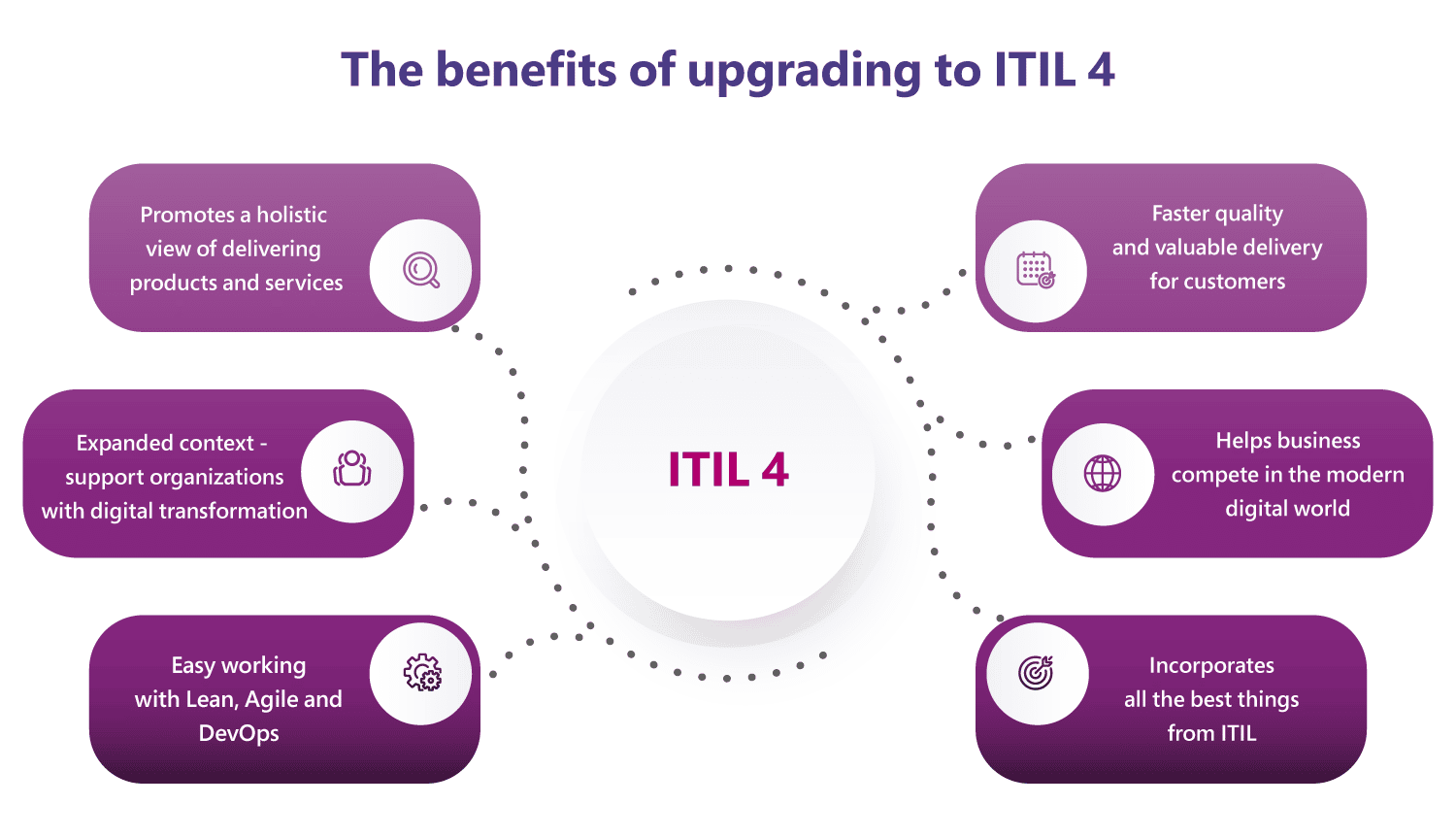A Comprehensive Guide to ITIL Training and Certification
A Comprehensive Guide to ITIL Training and Certification
Powering IT Best Practices with ITIL.
For those who wish to enter into the IT profession, it is imperative that they learn about all aspects of technology and terminology used within this field. The IT Infrastructure Library (ITIL) 4 courses provides students with an essential understanding on how various pieces fit together so as not only be able work professionally but also thrive career-long. Aspirants looking to pursue a lucrative IT career must learn the fundamental concepts and terminologies used across the tech universe.
For beginners, starting with ITIL 4 Foundation allows them to enter their career with knowledge of specific management jargon & concepts. Besides, it helps them understand how behavioral and cultural principles impact the work, driving the organization beyond technology. Here are the skills that every ITIL 4 Professional must have.
Top-Notch Proficiencies Every Astute ITIL Professional Possesses
Individuals with high certifications are in demand, not just by companies but also at the workplace level. This is because they offer a range of opportunities that can be accessed across all industries and business functions – from IT support to management roles.
The ITIL certifications are an exciting opportunity for professionals who want to explore new career paths in the field of information technology. This program not only provides training on technical processes but also offers a broader range opportunities that can be accessed by those with these certifications.
Upon boosting their resumes through the recognition received, project professionals and tech experts receive around a 15-20% hike in salaries. Since ITIL ranks the seventh most demanding IT certification, candidates start developing their skill sets to get the training and qualify. Here are the top-notch skills each ITIL professional has:
#1 Proficiencies for High-Quality Delivery
The ITIL framework is an internationally recognized approach to managing and delivering services. It provides value across projects, organizations or teams by empowering professionals with high-quality delivery skills that are used in various ways depending on the needs of each situation.
The key benefit for adopting this method includes improved collaboration between employees who work together within their respective departments as well as greater efficiency because all aspects have been documented beforehand so there’s no need wasting time rebuilding them from scratch every single time someone makes changes/modifications. It delivers value around a specific business. So, high-quality delivery skills get used in various projects, organizations, and teams.
#2 Worldwide Recognition
ITIL is a manifestation of consistency and continual growth. It has been used by practitioners across the globe to establish ITSM, with an emphasis on success for both practitioner’s careers as well as those who work within their organization; as well as consistency and continual growth. The certification provides access into new doors that can provide more opportunities in this ever-growing industry – one where there’s no shortage or demand.
#3 Aligning Disruptive Technologies
ITIL 4 is the fourth version that bridges the sought-after practices with Industry 4.0 (i.e. Fourth Industrial Revolution). This new framework allows companies to transition into digital technologies smoothly. It also offers flexible and practical support for the adaptation. By working holistically, this framework focuses on transparency, collaboration, and automating where possible.
Evolving technologies such as artificial intelligence, robotics, and IoT(Internet of Things) are critical for businesses to grow. However, they also come with limitations. ITIL 4 encompasses different methodologies to manage the iterative nature.
#4 Instilling a Proactive Culture
The ITIL framework has gone through many revisions to keep up with the ever-changing needs of consumers. The latest version, 4th edition focuses on improving user experience and creating sustainable change by focusing lessening precautions before they happen instead or inculcating a new culture that’s proactive rather than reactive.
The newest update in this long line is all about ensuring your customers are taken care farther down their list – not forgotten altogether. This helps plan for contingencies & take precautionary measures to prevent them from reoccurring. Besides, it also improves the service delivery quality and inculcates a newer proactive culture.
#5 Objective-Centric Strategies
Another critical aspect that ITIL 4 trains the aspirants is the focus on generating businesses. It enhances business productivity, competence, and customer relationships. That is how a ITIL 4 strategic leader tends to opt for budget-friendly strategies. This method not only optimizes resources but also offers a holistic approach to the work.
Before you opt for the ITIL training, a candidate requires enhancing skills like:
- Astute understanding of analytics and AI
- Knowledge of BRM or Business Relationship Management
- Knowledge of tech-enabled business capabilities
- Potential to manage customers
- Great collaboration and communication skills
- Problem-solving &analytical proficiencies
- Resolving complex business problems
- Flexible &agility
- Communication skills both verbal and written
- Management skills
- Negotiation skills, and more
The Dutiful Responsibilities of an ITIL Expert
ITIL experts have a deep understanding of the requirements for their specific industries, for them structuring and implementing a tailor-made IT solution management strategy is straightforward. They have an in-depth understanding of specified requirements. Effective ITIL management helps organizations in constant improvement of solutions according to customer needs.
With more businesses realizing the ITIL management benefits, the demand for certified experts is emerging at lightning speed. ITIL experts have several job roles according to their organizational requirements. The responsibilities might vary depending on their job role. A couple of them are:
- Service Strategy Manager: For communicating and implementing the strategy
- Demand Manager: For understanding and influencing customers’ requirements for services
- Business Relationship Manager: Maintains a relationship with customers, thereby identifying & ensuring that the service providers meet the customers’ needs
- Service Portfolio Manager: Decides the strategy for serving customers in cooperation with IT Steering Groups
Given below are the different ITIL job roles and responsibilities:
- Service Delivery Manager
- IT Manager
- IT Project Manager
- IT Analyst
- Engineering program manager
- Service Transition
- Senior IT Project Manager
- Service Operations
- Asset Manager
ITIL 4 is the latest evolution of an industry-leading framework that has been successful in delivering world class services to organizations around the globe. With technological change coming at such a rapid pace, IT professionals need training on how best they can utilize their skills and take advantage these opportunities for success with this global transformation occurring now more than ever before.
The roadmap for our ITIL certification path is available for download. Get started with ITIL 4 Foundation. Start to build your career with ITIL 4 or reaccredit from ITIL v3 to demonstrate your digital skills and meet your career goals.








